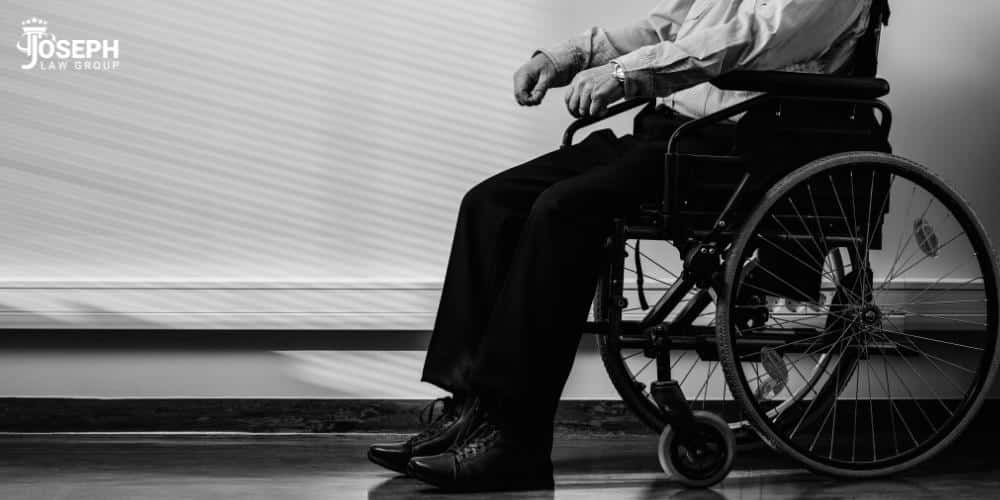While older generations tend to value their independence, there will often come a day when they require assistance to stay healthy and happy. Unfortunately, as older adults become more dependent on caregivers, they also become more at risk of suffering from elder abuse.
But what is elder abuse? Elder abuse is any willful or neglectful act that causes an elderly person to endure harm. This can include things like physical and sexual abuse, but also things like elder neglect, emotional abuse, and financial exploitation. In this post, we’ll go through some of the types of elder abuse, the risk factors that increase the likelihood of elder abuse, what warning signs to look out for, and what Ohio residents can do if they suspect an older adult is being abused.
Many different people can abuse older adults, including healthcare providers and family members. If your loved one has been abused or neglected, the Cleveland personal injury attorneys at Joseph Law Group are here to help you seek justice. We can help you file a claim against the negligent party responsible for your family member’s injuries and help hold them liable for their actions. Call our law firm at (216) 522-1600 to receive a free consultation regarding your elder abuse case.
How Common is Elder Abuse?
Unfortunately, elder abuse is more common than one might think. According to a study published by the National Institute of Justice, approximately 1 in 10 Americans over the age of 70 had experienced a form of elder abuse within a given year. Additionally, it is estimated that only 1 in 24 cases of elder abuse are even reported to authorities.
Many elderly people are the victim of neglect, and neglect in assisted living facilities and nursing homes can often be due to understaffing. According to the American Health Care Association, 94% of nursing homes faced staffing shortages in 2021.
Ohio Revised Code Section 5101.60
Ohio law requires any person who is aware of–or reasonably suspects–elder abuse to report it to the authorities. This includes any health care professionals, like nursing home staff, home health professionals, or those working in an assisted living facility. People should report elder abuse to their local County Department of Job and Family Services, which they can find by using the Ohio Job and Family Services website.

Types of Elder Abuse
There are many different types of elder abuse, including physical abuse, sexual abuse, emotional abuse, financial exploitation, and neglect. Regardless of the form it takes, abuse can affect the physical and psychological health of an older adult while they are vulnerable and likely unable to defend themselves. Abuse from nursing home staff or family caregivers occurs all too frequently in the United States, and most elder abuse goes unreported, leaving victims to suffer in silence without the help and care they need.
Physical Abuse
Physical elder abuse is any physical harm someone inflicts on an older person. This can include hitting, scratching, punching, shoving, kicking, or other actions that cause physical pain and/or bodily harm. Physical abuse of an older adult can also include putting physical restraints on them unnecessarily, giving them medications they are not prescribed, like sedatives, or being placed in the wrong position in a chair or bed.
Sexual Abuse
Sexual elder abuse refers to any non-consensual sexual contact a person makes with an older adult. This type of abuse can include rape, non-consensual touching, unwanted sexual conversations, forcing them to be naked or perform explicit acts in front of others, or taking explicit pictures of them without their consent. An abuser may choose to sexually assault a vulnerable adult, like an older adult with a physical or mental impairment, to take advantage of their physical or mental illness and exploit them.
Emotional / Psychological Abuse
Another form of elder mistreatment is emotional elder abuse, which occurs when a healthcare worker or other caregiver inflicts mental pain on an elderly person. This can be done through insults, threats, humiliation, or violation of privacy. Psychological abuse often involves an imbalance in power dynamics, so elderly people suffering from emotional abuse may feel completely helpless, which could make them hesitant or unable to seek help from others.
Neglect / Isolation
Elder neglect is another form of elder abuse and can be in the form of caregiver neglect or self-neglect. Caregiver neglect occurs when a nursing home caregiver or family caregiver fails to provide an elderly person with the care and help they need to stay healthy. This can include denying them access to things like medical aids, clean clothes or bedsheets, food and water, necessary medications, and even social interaction. Abandoning an elderly person and leaving them without a caregiver can also be considered neglect.
Self-neglect occurs when an older person either chooses not to take care of themselves or ask for help, or they become unable to ask for help. While this can occur in a nursing home setting, it shouldn’t. Nurses and other staff should be regularly checking on patients to ensure their basic needs are met. When they don’t, they could be held liable for the damages in a nursing home abuse case.
Financial Abuse
Lastly, people can take advantage of older adults through financial exploitation. Elder financial abuse can occur when someone tries to gain access to an elderly person’s credit cards, bank accounts, retirement funds, or social security benefits. People can also commit financial abuse by changing an older adult’s life insurance policy or by giving themselves power of attorney over the older person’s last will and testament.

How To Spot Elder Abuse
Like most forms of abuse, most elder abuse occurs behind closed doors. However, there are warning signs to look out for – both in institutional settings and at home with family – that can indicate someone is the victim of elder abuse. Some of the warning signs of elder abuse include:
- Unusual weight loss;
- A decline in emotional well-being;
- Lack of interest in social and family ties;
- Repeated physical injuries like broken bones, bed sores, and bruises;
- Sudden unpaid bills when they should be able to pay bills;
- Sudden or increased paranoia;
- Unexplained changes in behavior;
- New sexually transmitted diseases; and
- Unusual bank activity.
Older adults are some of the most vulnerable members of our society, which is why they are all too frequently targeted by abusers who take advantage of them. No person deserves to experience any form of abuse, whether that’s physical abuse, emotional abuse, sexual abuse, or neglect, and knowing the warning signs of elderly abuse can help put a stop to some of these terrible acts.
Who is at an Increased Risk for Elder Abuse?
Certain risk factors can put some older adults at a higher risk for elder abuse than others. Factors that can put someone at serious risk for elder abuse include:
- Dementia;
- Living with a large number of family members;
- Poor physical or mental health;
- Lack of familial or community support;
- Low income; and
- Having family members that are struggling with substance abuse.

What To Do If You Suspect Elder Abuse
If you suspect an elderly family member or other older adult is suffering from elder abuse, contact your local adult protective services. You can also call the statewide toll-free number (855) 644-6277 to report abuse or suspected abuse 24 hours a day, 365 days a year. You can learn more about your local agency on aging through the Ohio Department of Aging.
Can You File a Personal Injury Claim for Elder Abuse?
Yes, if your family member has been the victim of elder abuse, you can potentially file a personal injury claim against the person responsible for their injuries. Abuse can harm a person’s mental and physical health, and can cause them a great deal of suffering. A personal injury case can help the victim of a negligent act recover compensation for their injuries and other damages, like medical bills and emotional distress.
Depending on the circumstances surrounding the abuse, the elderly person or their family could file a medical malpractice, premises liability, or wrongful death claim. To discuss your legal options regarding your elder abuse case, call Joseph Law Group at (216) 522-1600 to schedule a free consultation.

How the Personal Injury Lawyers at Joseph Law Group Can Help You in an Elder Abuse Case
If you suspect that one of your family members is being abused or neglected in an assisted care facility or nursing home, call the Ohio elder abuse lawyers at Joseph Law Group as soon as possible. With a long history of successful case results, you and your family can rest easy knowing your case is in capable hands. Call us at (216) 522-1600 or contact us online so that we can discuss your elder abuse case today.

















